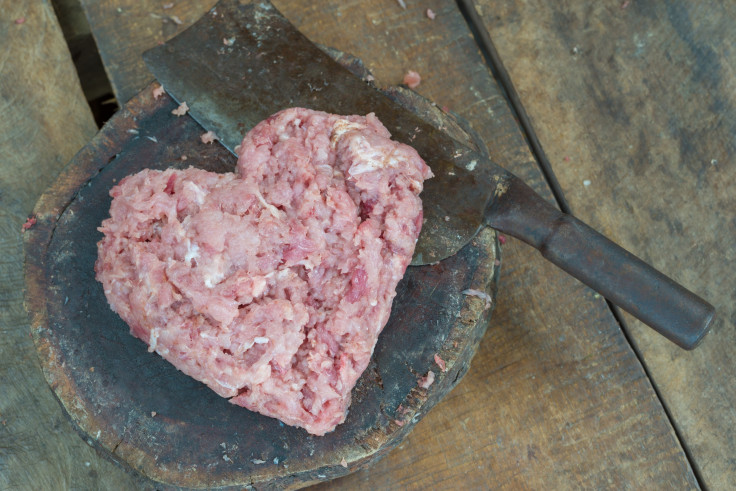Dieters With Symptoms Of Heart Disease Should Take It Easy On High-Protein Foods

Protein diets are popular, but new findings bring to light the dangers a plate packed with meat could bring people trying to lose weight. An international team of researchers expressed new concerns about high-protein diets at the European Congress on Obesity in Prague, Czech Republic.
Researchers looked at data from more than 7,000 men and women 55 years old and over who had no history of heart disease. They filled out food questionnaires that asked them about their diet trends in the last five years. All of them either had type 2 diabetes or three or more of the following risk factors for heart disease: smoking, high blood pressure, poor cholesterol levels, overweight or obesity, or a family history of premature heart disease.
It turns out that when participants replaced carbohydrates with protein, their risk of gaining 10 percent more body fat increased 90 percent, while their risk of death from any cause increased by 59 percent. When protein replaced fat, the risk of death rose 66 percent. While the researchers weren't sure why there was a link between high-protein diets and weight gain, previous research has shown animal protein intake is linked to kidney disease, changes in how the body processes insulin and metabolism, and blood fat.
"These results do not support the generalized use of high-protein diets as a good strategy for losing weight," said the study’s lead researcher Monica Bullo, of Pere Virgili Health Research Institute in Reus, according to HealthDay. "Long-term efficacy and safety of these diets deserve more attention.”
Dieters look to stuff protein into their meals hoping to lose weight, but according to the Centers for Disease Control and Prevention, American adults are already eating enough protein. Part of the problem is that many people don't know how much protein they need, or how to measure it correctly. A survey from NPD research group found 70 percent of people fell into this category. Meanwhile, NPD found more than half of the Americans reported trying to incorporate more protein into their diets, and were attracted to protein-oriented products.
"High-protein diets are attractive because people feel they are given free rein to eat as much bacon, steak, and pork as they like," Samantha Heller, a senior clinical nutritionist at New York University Medical Center in New York City, told HealthDay. In addition, cutting carbohydrates causes quick initial weight loss, she said, since it's mostly water weight.
Because high-protein diets provide quick results, they’ve become increasingly popular and appealing to a nation that’s 69 percent overweight and obese. However, the problem with high-protein diets like Dukan and South Beach is that they are linked to an increased risk of heart disease, colon cancer, and diabetes. Choosing chicken and steak over bread and pasta may seem healthier, but it could also lead someone to cut down on healthy foods such as fruits, vegetables, whole grains, and legumes, Heller said.
"Research suggests that the connection between a high intake of animal foods and health may be related to how the meats are processed, how we cook them, and how our bodies use them," Heller said. "Overall, the research is pretty clear that more plant-based diets offer a wide array of health benefits, including lower risks of many chronic diseases, better weight management, and healthier hearts and brains.”
Source: Bullo M, Heller S, and Fonarow G. At The European Congress on Obesity. 2015.
Published by Medicaldaily.com



























